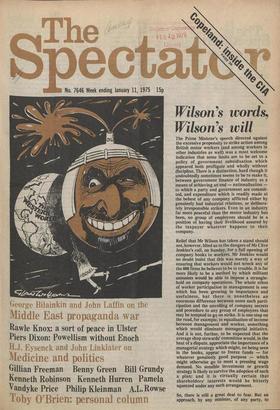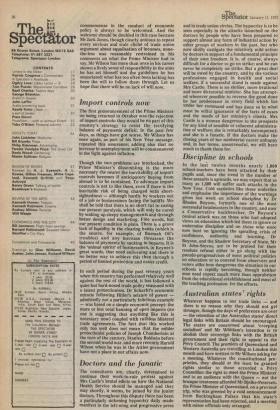Wilson's words, Wilson's will
The Prime Minister's speech directed against the excessive propensity to strike action among British motor workers (and among workers in other industries as well) was a most welcome indication that some limits are to be set to a policy of government subsidisation which appeared both profligate and wholly without discipline. There is a distinction, hard though it undoubtedly sometimes seems to be to make it, between government finance of industry as a means of achieving an end — nationalisation — to which a party and government are committed, and expenditure which is readily made at the behest of any company afflicted either by genuinely bad industrial relations, or deliberately irresponsible strikers. Even in an industry far more peaceful than the motor industry has been, no group of employees should be in a position of having their livelihood assured by the taxpayer whatever happens to their company.
Relief that Mr Wilson has taken a stand should not, however, blind us to the dangers of Mr Clive Jenkins's call, on Sunday, for a full opening of company books to workers. Mr Jenkins would no doubt insist that this was merely a way of ensuring that workers would not wreck any of the 600 firms he believer to be in trouble. It is far more likely to be a method by which militant unionists would be able to impose a stranglehold on company operations. The whole ethos of worker participation in management is one which has been growing in importance and usefulness, but there is nonetheless an enormous difference between some such participation and the unveiling of company secrets and procedure to any group of employees that may be tempted to go on strike. It is one step on the road, for example, to equalisation of income between management and worker, something which would eliminate managerial initiative. And it is not, further, to be expected that the average shop stewards' committee would, in the heat of a dispute, appreciate the importance of a managerial strategy which might, on being seen in the books, appear to freeze funds — for whatever genuinely good purpose — which might otherwise go to meet a pressing wage demand. No sensible investment or growth strategy is likely to survive the adoption of such a plan; and it is virtually certain that shareholders' interests would be bitterly squeezed under any such arrangement.
So, there is still a great deal to fear. But an approach, by any minister, of any party, to commonsense in the conduct of economic policy is always to be welcomed. And the welcome should be doubled in this case because Mr Jack Jones, though clearly anxious to repeat every envious and stale cliché of trade union argument about equalisation of incomes, nonethe-less was reasonably restrained in his comments on what the Prime Minister had to say. Mr Wilson has more than once in his career shown a lively sense of responsibility in the aims he has set himself and the guidelines he has enunciated: what has too often been lacking has been the will to follow them through. Let us hope that there will be no lack of will now.
import controls now
The first pronouncement of the Prime Minister on being returned in October was the rejection of import controls: they would be no part of this country's strategy to resist the terrifying balance of payments deficit. In the past few days, as things have got worse, Mr Wilson has once again, as part of his New Year message, repeated this assurance; adding also that no increase in unemployment will be countenanced in the fight against inflation.
Though the two problems are interlocked, the Prime Minister's dissembling is the more necessary the nearer the inevitability of import controls becomes if anticipatory buying from abroad is to be contained. To advocate import controls is not to like them, even if there is the inevitable risk of being charged with shortsightedness — although hardly by workers out of a job or businessmen facing the bailiffs. We shall be told that there is no short cut to easing our present paralysis, which will only be cured by waking up sleepy managements and through better design and marketing. Fine words, but our present condition is plain. There is a grave lack of liquidity in the clearing banks (which is the source, for example, of Burmah Oil's troubles) and any increase threatens the balance of payments by sucking in imports. It is the 'animal spirits' of businessmen, in Keynes's great words, that need enlivening and there is no better way to achieve this than through a period of limited protection and easier credit.
In each period during the past seventy years when this country has performed relatively well against the rest of the world, it has followed a quiet but hard-nosed trade policy seasoned with a latent protectionism. Dr Schacht's economic miracle following Hitler's seizure of power — admittedly not a particularly felicitous example — was based on a simple economic precept: the more or less total banning of open imports (no one is suggesting that anything like this is necessary now) coupled with ruthless bilateral trade agreements. The fact that this worked only too well does not mean that the milder protectionist policies of Joseph Chamberlain at the turn of the century, Stanley Baldwin before the second world war, and more recently Harold Wilson when he was in the Attlee government have not a place in our affairs now.
Doctors and the fanatic
The consultants are, clearly, determined to continue their work-to-rule protest against Mrs Castle's brutal edicts on how the National Health Service should be managed and they may shortly, it seems, be joined by the junior doctors. Throughout this dispute there has been a particularly sickening hypocrisy daily made manifest in the left-wing and progressive press and in trade union circles. The hypocrisy is to be seen especially in the attacks launched on the doctors by people who have been prepared to support almost any form of industrial action by other groups of workers in the past, but who now shrilly castigate the relatively mild action by doctors in support of a fundamental principle of their own freedom. It is, of course, always difficult for a doctor to go on strike; and he can never be completely on strike. But a great deal will be owed by the country, and by the various professions engaged in health and social welfare, if a successful stand is made against Mrs Castle. There is no shriller, more irrational and more dictatorial minister. She has attempted wherever possible to reverse the good done by her predecessor in every field which lies under her command and has done so in what must be wilful ignorance of the facts of cases and the needs of her ministry's clients. Mrs Castle is a woman dangerous to the prospects for any kind of sensible or coherent administration of welfare; she is remarkably incompetent; and she is a fanatic. If the doctors make the closing years of her ministerial career unhappy and, in her terms, unsuccessful, we will have much to thank them for.
Discipline in schools
In the last twelve months nearly 1,000 school-teachers have been attacked by their pupils and, since the trend in the number of these assaults is upwards, we may expect that as many as 1,500 will suffer such attacks in the New Year. Cold statistics like these underline and emphasise the importance of the warnings given last week on school discipline by Dr Rhodes Boyson, formerly one of the most successful headmasters in the country, and now a Conservative backbencher. Dr Boyson's central attack was on those who had adopted views on education which led them to ignore or undermine discipline and on those who were now bent on ignoring the spiralling crisis of confidence, authority and learning. Dr Boyson, and the Shadow Secretary of State, Mr St John-Stevas, are to be praised for their resolute refusal either to go along with the pseudo-progressivism of most political policies on education or to conceal from observers and voters alike how dangerous the situation in our schools is rapidly becoming, though neither man need expect much more than opprobrium from the educational establishment and most of the teaching profession for the efforts.
Australian states' rights Whatever happens to our trade links — and there is no reason why they should not get stronger, though the days of preference are over — the retention of the Australian states' direct legal links with Britain should be encouraged. The states are concerned about 'creeping socialism' and Mr Whitlam's intention is to abolish their sovereign links with the British government and their right to appeal to the Privy Council. The premiers of Queensland and Western Australia are travelling to London this month and have written to Mr Wilson asking for a meeting. Whatever the constitutional proprieties, they should at the least be granted rights similar to those accorded a Privy Councillor: the right to meet the Prime Minister and to an audience with the Queen — not the brusque treatment afforded Mr Bjelke-Petersen, the Prime Minister of Queensland, on a previous trip, who was greeted by a cold announcement from Buckingham Palace that his state's representation had been rejected, and a meeting with minor officials only arranged.



























